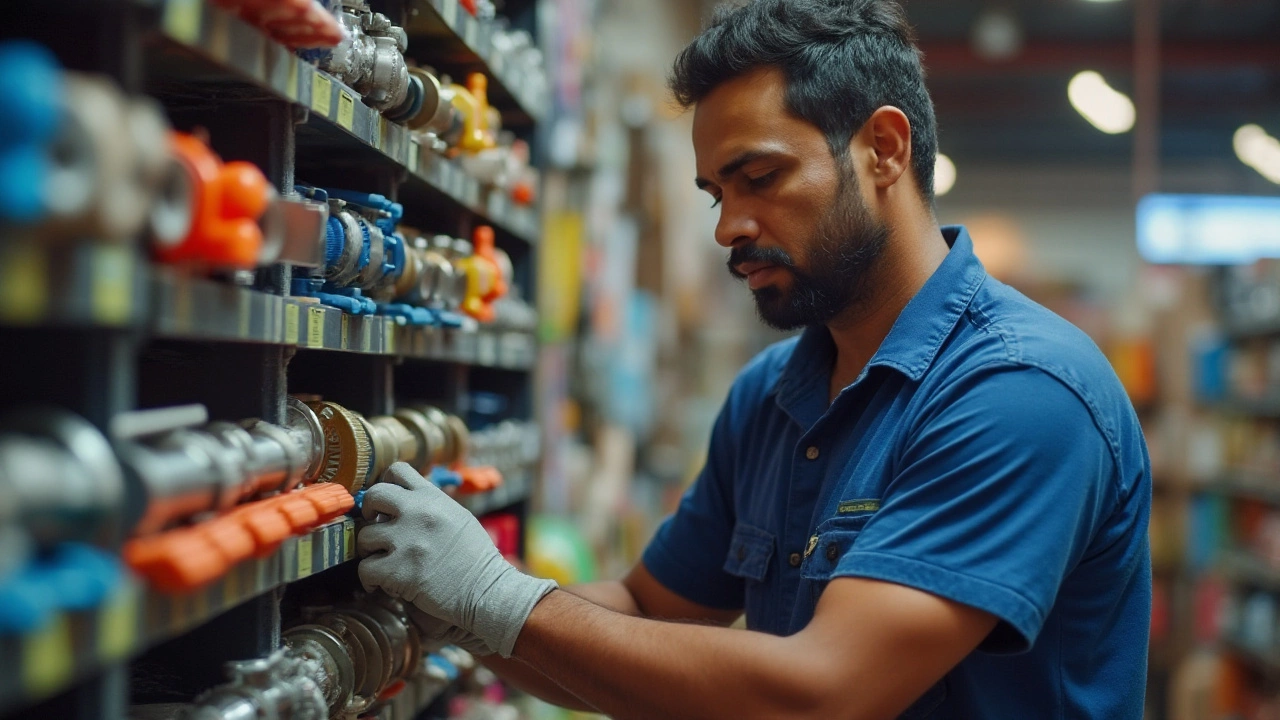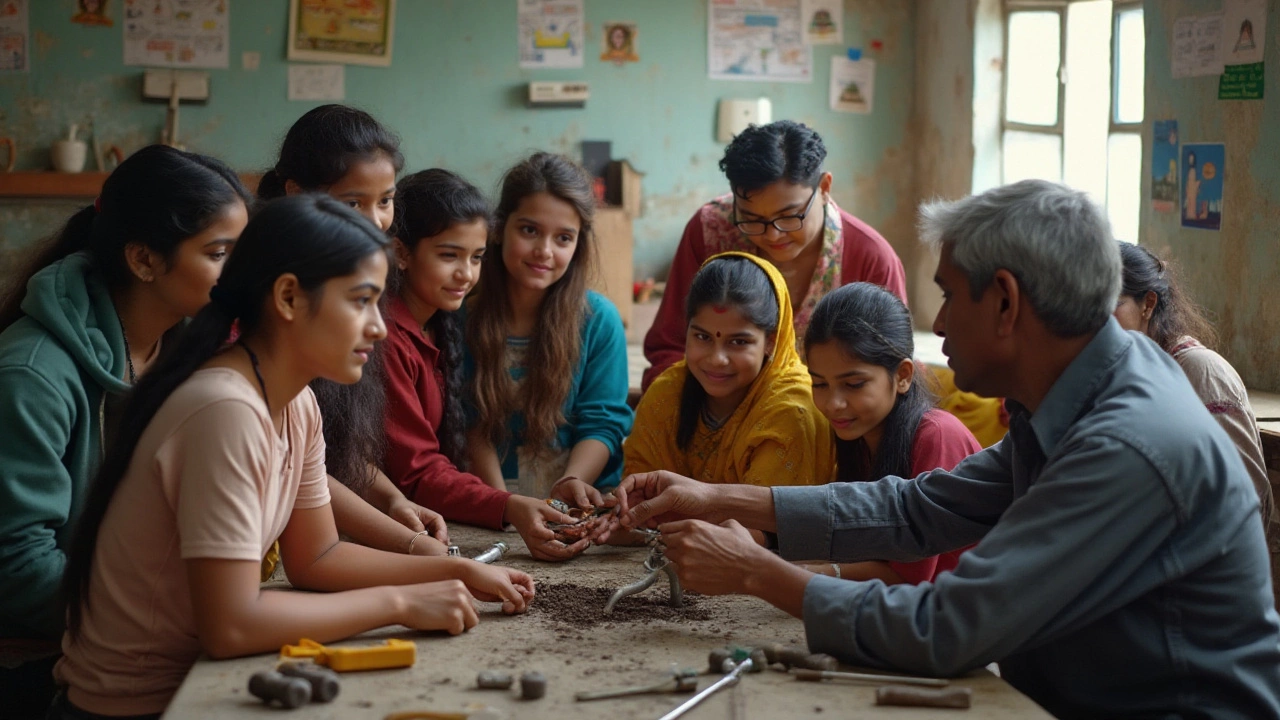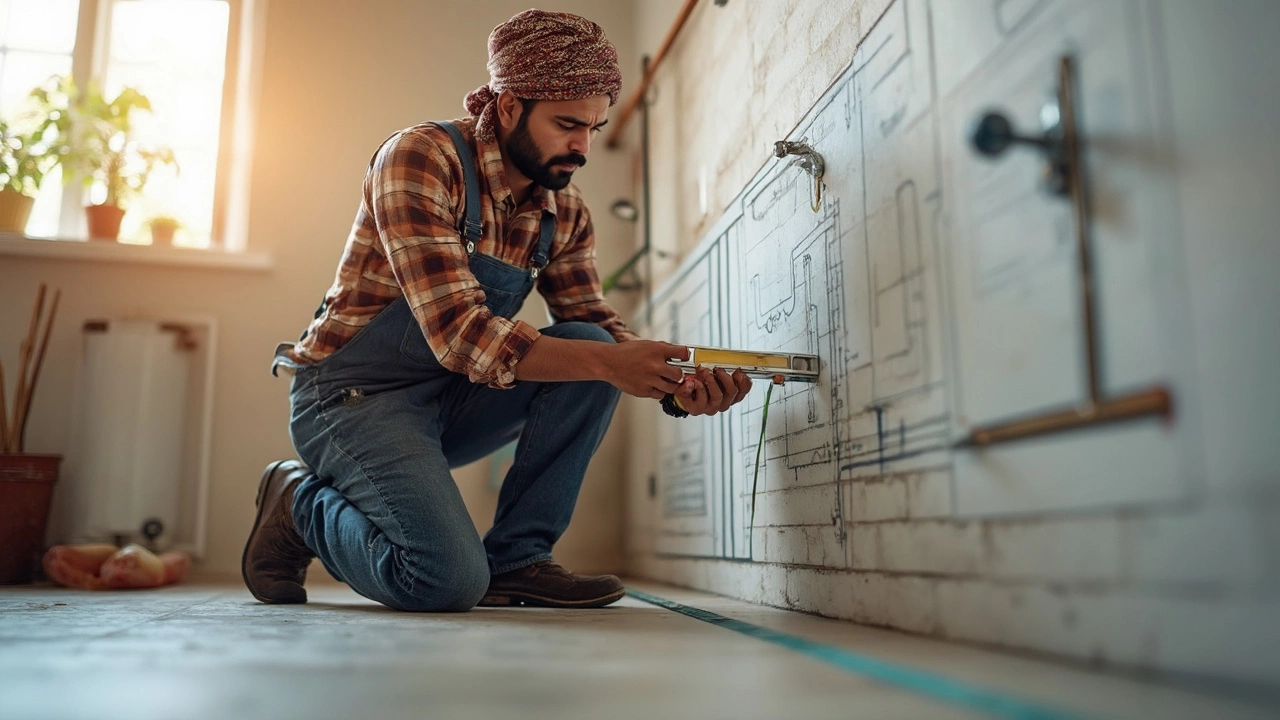When entering the world of plumbing, understanding the foundational level is crucial for budding plumbers. It’s not just about fixing leaky faucets; plumbing at its core involves a plethora of skills and knowledge. At the entry-level, you learn about the simplest of tasks which lay the groundwork for more advanced lessons.
Starting with the right tools and a keen understanding of basic concepts is key. Imagine plumbing as a puzzle—each small task you master is a piece that helps you complete the bigger picture. Navigating through this training will require patience and attention to detail, traits that define successful plumbers.
- Introduction to Plumbing Basics
- Essential Plumbing Tools
- Core Skills for Beginners
- Tips for New Plumbers
Introduction to Plumbing Basics
Diving into the world of plumbing, the first step is grasping the basics—think of it as laying the foundation of your expertise. Many might assume that plumbing is merely about knowing pipes and fittings, but there's so much more beneath the surface. The complexity of water systems and drainage, though often unnoticed, is critical to our daily comforts like having a hot shower or a functioning kitchen sink. As an aspiring plumber, you'll need to explore these fundamental systems to uncover how they contribute to a seamless experience at home or in any building.
"In any home, plumbing is as much about science as it is about simple practicality," said renowned plumbing instructor Jeff Wilcox.
The very first aspect you'll learn about in any plumbing training is understanding the materials. Copper, PVC, and PEX are not just arbitrary choices; each material serves a specific purpose dictated by durability and function. Copper, for example, is known for its reliability in both hot and cold water applications, while PEX offers cost-effective flexibility in new installations. As a plumbing basics learner, recognizing where and why each material is used is pivotal—it forms the backbone of effective plumbing work.
Historical Evolution and Modern Implications
Plumbing has evolved significantly from its early history when rudimentary systems were discovered in ancient civilizations. The Romans, for instance, mastered aqueducts, leading to innovations that modern plumbing systems still reflect. Knowing this history isn't just about trivia; it informs today's best practices. Fast forward to today, and plumbing has become a sophisticated blend of tradition and technology. Emerging tools use laser precision to detect leaks, and computerized models can predict water flow patterns. This means that comprehensive plumbing training not only incorporates time-tested techniques but also embraces technological advancements.
Understanding Water Systems
Plumbing isn't only about pipes; it's also intricately tied to water. Grasping the essentials of how water heating and water pressure work provides a strong footing for more complex systems. Understanding that heating works on simple principles of thermodynamics makes the job of a plumber excitingly scientific. You’ll encounter terms like psi (pounds per square inch) regularly, as water pressure needs balancing to avoid unwanted bursts or drips. This basic scientific understanding equips you to solve complex plumbing challenges creatively.
In entry-level plumbing courses, real-life applications of these concepts are taught through dynamic discussions and hands-on workshops. After all, knowing how to apply theory practically is what turns a learning experience into career readiness. If you’re eager to start this journey, remember: the world of plumbing needs more skilled hands and agile minds to flourish.

Essential Plumbing Tools
Diving into the world of plumbing requires more than just enthusiasm—it demands the right set of tools. These plumbing tools are the backbone of daily tasks, and without them, a plumber's efficiency could be severely hampered. Among the first lessons any aspiring plumber learns is recognizing and wielding these tools. A crescent wrench is not just a heavy piece of metal but an essential instrument in a plumber's arsenal. It's designed specifically to help grip and turn pipes of varying sizes. Another indispensable tool is the pipe cutter, which gives plumbers the power to make precise cuts, an essential skill when dealing with copper piping.
The plunger might appear simple, but it's an absolute lifesaver, especially when dealing with clogged toilets or drains. It's funny how this household tool is often underestimated until disaster strikes. Similarly, pipe wrenches are essential when working with larger pieces of plumbing. They provide the necessary torque to loosen and tighten pipes that have been set in place for years. Imagine trying to uproot a deeply embedded tree without the right tools. That's what a plumber faces without these trusty tools.
One cannot forget about the plumber’s tape, a miracle worker when it comes to preventing leaks at threaded joints. This unassuming roll of tape might seem unimportant, but its use can save a plumbing job from an unfortunate slip-up. Then there's the basin wrench, a humble tool that has saved countless plumbers from the frustration of reaching nuts in tight spaces. Speaking of tight spaces, a flashlight is your best friend when exploring the hidden corners of a customer's home plumbing system.
According to renowned plumber, John Doe, "The tools you carry are not just objects, but extensions of your hands. Master them, and you master the craft."
The tools you carry are not just objects, but extensions of your hands. Master them, and you master the craft.He emphasizes that knowing your tools by heart could make or break your efficiency and ability to solve problems on the spot. Many senior plumbers suggest starting with a basic toolkit and gradually adding more specialized tools as you gain experience and face diverse plumbing challenges. Each tool is a metaphorical notch on a plumber's belt, marking a unique challenge tackled and solved.
Below is a list of crucial tools any entry-level plumber should consider:
- Crescent Wrench
- Pipe Cutter
- Plunger
- Pipe Wrench
- Plumber’s Tape
- Basin Wrench
- Flashlight

Core Skills for Beginners
Diving into the world of plumbing, one must first tackle the plumbing basics to become adept at addressing typical household issues. These skills are foundational and serve as the bedrock upon which more complex techniques are built. By mastering these core skills, an aspiring plumber sets themselves on a path to become proficient and capable of taking on greater challenges.
Understanding pipe systems is a vital skill. Newcomers must gain knowledge about different materials like copper, PVC, and PEX plumbing, which are frequently used in both residential and commercial properties. Recognizing how each material behaves and its specific applications is essential. This includes learning cutting, joining, and installing pipes safely and efficiently. As Michael Stevens, a respected tradesman, often says,
“Knowing your pipes is like knowing the lines of communication in a building—it’s where everything starts and ends.”
Next, mastering leak detection can be seen as both a science and an art. Beginners must develop a keen eye for spotting leaks early before they become serious problems. This involves listening for the subtle sound of dripping water or using dye tests to reveal potential leaks in toilet tanks. Detecting the source of a leak can sometimes involve a bit of detective work, and each leak can tell a story of the surrounding infrastructure's health.
Understanding Drainage and Venting
Effective drainage and venting systems ensure that water flows out smoothly and that harmful gases do not build up inside plumbing systems. Beginners need to learn how to read and interpret plumbing codes regarding venting to ensure safety and compliance. This knowledge stretches beyond merely knowing how the system functions; it involves understanding the principles of pressure and gravity that make plumbing systems work effectively.
Handling basic tools like wrenches, pliers, and pipe cutters with confidence is another necessity. These tools are extensions of a plumber's skill set and knowing how to control them sharpens a beginner's technical ability and efficiency. The finesse with which these are used can drastically affect both the time taken and the outcome of any plumbing task.
Water Heater Basics
Every beginner plumber should familiarize themselves with water heaters. From installation to routine maintenance, understanding the inner workings of these essential devices helps prevent disastrous failures and prolongs system lifespan. Learning to make adjustments, pinpointing thermostat settings, and performing basic maintenance checks are skills that are invaluable in any plumber’s toolkit.
The ability to communicate with customers, while not a technical skill, is crucial for newcomers. This involves not only diagnosing issues but also explaining them in layman's terms to ensure understanding and satisfaction. Strong communication builds trust and often plays a decisive role in building a successful career in plumbing.

Tips for New Plumbers
Embarking on a journey in the plumbing industry can seem daunting at first, but like any great expedition, it begins with the right preparation and a keen eye for detail. The world of plumbing is rich with opportunities for those willing to learn and adapt. The first and perhaps most significant tip is to dive deep into understanding the plumbing basics. Owning a strong foundation will help you enormously as you proceed to more complex tasks. It’s imperative to become familiar with the terminology, different types of pipes, fittings, and fixtures. This knowledge will not only serve you in practical scenarios but also earn the respect of seasoned professionals and clients alike. Patience is not just a virtue here but a necessity as the learning curve can be steep, and you should always be open to asking questions and seeking advice from experienced plumbers.
Once you have a grasp on the plumbing skills, equipping yourself with a set of essential tools is the next logical step. A comprehensive toolkit is a plumber's best companion, and knowing which tool to use for which job is crucial. Initiate your toolkit with a wrench set, plunger, pipe cutters, and a flashlight, among other tools. In fact, investing in quality tools will save you both time and money in the long run, as cheap tools are prone to break and contribute to job inefficiencies. Reach out to vendors or mentors who can provide insights on the best brands and models for entry-level work. Remember, tools are extensions of the plumber’s skills, and the more intimately you understand them, the better you'll be at your job.
Plumbing training involves more than just knowledge and tools; it also demands honing specific core skills that are indispensable in this profession. Developing diagnostic skills is particularly important—being able to identify the root cause of a problem efficiently can greatly enhance your effectiveness on the job. Hand-eye coordination, physical stamina, and dexterity are other essential skills. There's also an increasing need for plumbers to have a basic understanding of math and science; knowing the physics behind water flow can improve your overall expertise. With advancements in technology, being comfortable with digital devices and software, such as plumbing apps, can give you an additional edge over others less tech-savvy.
Here’s a piece of wisdom that can guide you well through your initial days.
"An apprentice must be patient and cast the curious smile of a child upon every challenge," as the famous craftsman and author John Ruskin once advised. This encapsulates the attitude you need: a balance of patience, curiosity, and diligence.Moreover, networking can prove invaluable, providing a support system and opening doors to new opportunities. Join professional organizations, participate in workshops and trade shows, and keep a portfolio of your projects. These activities not only expand your knowledge but also bridge connections with other plumbing professionals who may have faced similar challenges and who can offer advice.
Always stay informed on industry trends and regulations. Plumbing codes and practices can vary significantly by location and change over time; staying updated on relevant standards will keep you compliant and attractive to potential clients. Having this careful attention to detail in compliance will ensure that you always maintain high-quality standards in your work. Furthermore, continue learning even after you've made your mark. The best plumbers are those who are willing to adapt and learn continuously. Think of every challenge as an opportunity to learn something new, whether it's a new technique, material, or technology. Keep that curious smile alive, and remember that growth is an ongoing journey.


